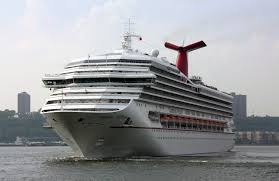
The cruise sector's resilience shines post-pandemic, buoyed by pent-up demand and a thirst for unique experiences. The Cruise Lines International Association (CLIA) forecasts 35.7 million passengers cruising in 2024, and a market growth of 5.1% CAGR to $36.67 billion by 2028.
With an anticipated 18% capacity rise in 2024, the cruise industry thrives on personalized experiences and understanding consumer preferences. Factors such as new-to-cruise travelers, multi-generational trips, expedition cruises, and a robust workforce fuel this growth.
The cruise industry navigates unexpected disruptions, such as infrastructure failures, and addresses sustainability demands through fleet upgrades. Despite these challenges, strong bookings, rising occupancy rates, and robust demand are compelling companies to contemplate expanding their capacity this summer.
Given this backdrop, let’s compare two travel cruise stocks, Carnival Corporation & plc (CCL) and Royal Caribbean Cruises Ltd. (RCL), to determine which is the better pick.
The Case for Carnival Corporation & plc Stock
Carnival Corporation & plc (CCL) engages in the provision of leisure travel services internationally. The company operates through four segments: NAA Cruise Operations, Europe Cruise Operations, Cruise Support, and Tour and Other.
CCL’s stock has declined 19.9% year-to-date to close the last trading session at $14.85. However, it has gained 51.1% over the past year.
CCL’s revenue grew at a CAGR of 200.5% over the past three years. However, its Tang Book Value decreased at a CAGR of 34.8% over the past three years.
In terms of forward EV/EBIT, CCL is trading at 15.48x, 10.2% higher than the industry average of 14.05x. On the other hand, the stock’s forward EV/EBITDA of 8.48x is 13.7% lower than the industry average of 9.82x.
In terms of the trailing-12-month gross profit margin, CCL’s 50.52% is 37.3% higher than the 36.79% industry average. Its 19.26% trailing-12-month Capex / Sales is 541.6% higher than the 3% industry average. However, the stock’s 3.67% trailing-12-month Return on Total Capital is 40.5% lower than the 6.18% industry average.
For the fiscal first quarter, which ended on February 29, 2024, CCL's revenues increased 22% year-over-year to $5.41 billion. The company's operating income stood at $276 million, compared to an operating loss of $172 million in the year-ago quarter. However, its adjusted net loss and adjusted loss per share narrowed 73.9% and 74.5% over the prior-year quarter to $180 million and $0.14, respectively.
For the quarter ending May 31, 2024, CCL’s revenue is expected to increase 15.2% year-over-year to $5.66 billion. Its EPS for the same quarter is expected to remain negative. It surpassed the Street EPS estimates in three of the trailing four quarters.
CCL’s stock is trading below its 50-day and 200-day moving averages of $15.36 and $15.38, respectively.
CCL’s POWR Ratings reflect this uncertain outlook. It has an overall rating of C, translating to Neutral in our proprietary rating system. The POWR Ratings assess stocks by 118 different factors, each with its own weighting.
It has a C grade for Momentum, Sentiment, and Quality. Within the Travel - Cruises industry, CCL is ranked #3 out of 4 stocks. To see CCL’s rating for Growth, Value, and Stability, click here.
The Case for Royal Caribbean Group Stock
Royal Caribbean Group (RCL) RCL operates as a cruise company worldwide. The company operates cruises under the Royal Caribbean International, Celebrity Cruises, and Silversea Cruises brands, which comprise a range of itineraries.
RCL’s stock has gained 89.6% over the past year to close the last trading session at $140.75.
RCL’s revenue grew at a CAGR of 307.4% over the past three years. However, its Tang Book Value declined at a CAGR of 19.6% during the same period.
In terms of forward non-GAAP P/E, RCL is trading at 12.83x, 19.4% lower than the industry average of 15.91x. On the contrary, its forward Price/Sales is trading at 2.22x, 145.3% higher than the 0.90x industry average.
In terms of the trailing-12-month EBITDA margin, RCL’s 32.93% is 196.2% higher than the 11.12% industry average. Its 52.61% trailing-12-month Return on Common Equity is 371% higher than the 11.17% industry average. On the other hand, the stock’s 0.43x trailing-12-month asset turnover ratio is 56.3% lower than the 0.99x industry average.
For the fiscal first quarter that ended on March 31, 2023, RCL’s total revenues increased by 29.2% year-over-year to $3.73 billion, while its operating income rose 175.7% year-over-year to $750 million. The company reported adjusted EBITDA of $1.17 billion, up 82.9% over the prior-year quarter.
For the same quarter, its adjusted net income attributable to RCL and adjusted earnings per share stood at $478 million and $1.77, respectively, compared to an adjusted net loss and adjusted loss per share of $59 million and $0.23.
Street expects RCL’s revenue for the quarter ending June 30, 2024, to increase 14.6% to $4.04 billion. Its EPS for the same quarter is expected to increase 49.7% year-over-year to $2.72. It surpassed the Street EPS estimates in each of the trailing four quarters.
RCL’s stock is trading above its 50-day and 200-day moving averages of $134.59 and $113.87, respectively.
RCL’s POWR Ratings reflect a mixed outlook. It has an overall rating of C, which translates to a Neutral in our proprietary rating system.
It has a C grade for Growth, Value, Momentum, and Quality. Within the same industry, it is ranked #2. In total, we rate RCL on eight different levels. In addition to what we stated above, we have also rated RCL for Stability and Sentiment. Get all the RCL ratings here.
CCL vs. RCL: Which Travel Stock to Buy This Summer?
The travel sector is flourishing due to an increase in young tourists, heightened enthusiasm for experiences, and the revival of business trips. Recent travel patterns indicate a preference among travelers for journeys that blend work with exploration, relaxation, and discovery.
Moreover, travel firms are integrating digital innovations to align with evolving consumer demands and sustainability objectives, further enhancing the industry's growth potential. Both CCL and RCL look well-positioned to capitalize on the industry’s promising prospects.
However, RCL’s superior financial standing, robust momentum, strong price performance, and positive analyst forecasts make it the better investment option compared to CCL.
Our research shows that the odds of success increase when one invests in stocks with an Overall Rating of Strong Buy or Buy. View all the top-rated stocks in the Travel - Cruises industry here.
What To Do Next?
Get your hands on this special report with 3 low priced companies with tremendous upside potential even in today’s volatile markets:
3 Stocks to DOUBLE This Year >
RCL shares were trading at $140.51 per share on Wednesday afternoon, down $0.29 (-0.21%). Year-to-date, RCL has gained 8.51%, versus a 11.57% rise in the benchmark S&P 500 index during the same period.
About the Author: Abhishek Bhuyan

Abhishek embarked on his professional journey as a financial journalist due to his keen interest in discerning the fundamental factors that influence the future performance of financial instruments.
Carnival (CCL) vs. Royal Caribbean (RCL): Which Travel Stock to Buy This Summer? StockNews.com






